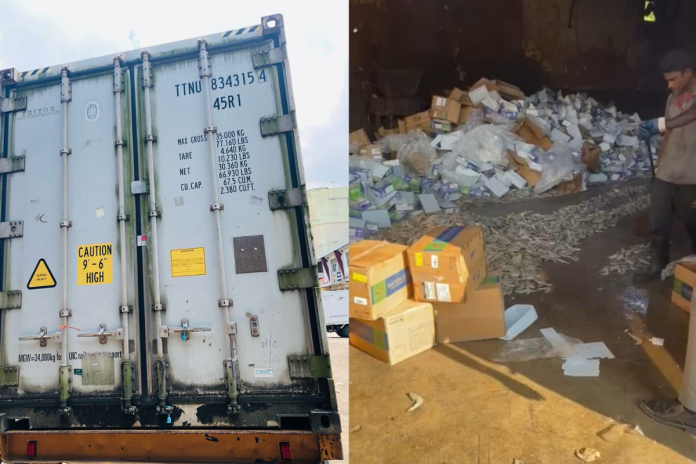A special investigation has been launched into the alleged illegal removal of a container of expired shrimp from the Colombo Port. The shipment, imported from the United States and officially recommended for destruction, was instead taken to a private company operating within the Peliyagoda Fish Market Complex and processed using industrial grinders.
The Consumer Affairs Authority (CAA) initiated the probe following a tip-off that the expired shrimp, which was marked for destruction, was being moved to the Peliyagoda facility and potentially prepared for public sale. Upon inspection, authorities discovered that a large quantity of shrimp had already been ground at the facility, which manufactures animal feed.
A senior CAA official confirmed that the company had no valid licence from the Central Environmental Authority (CEA) to destroy food items or any goods deemed unfit for consumption. The head of the importing company has been summoned to the CAA on 6 April, and is required to present all relevant licences and documentation pertaining to the destruction process.
Investigators suspect attempts were made to reintroduce the expired shrimp into the market, bypassing proper disposal procedures and depriving the government of potential revenue.
The container had been released from the port under the supervision of officials from multiple government agencies, including Sri Lanka Customs. However, the CAA maintains that it is illegal to transport food items meant for destruction to a facility producing animal feed.
The two containers in question arrived at Colombo Port from the United States in January, carrying a combined total of 50,000 kilograms of large shrimp. Port Authority employees revealed that the stock had initially been put up for tender after the importer failed to claim it. However, no buyers came forward due to a higher bid placed by Sri Lanka Customs.
One of the containers was later taken by the same private company in Peliyagoda, which had also submitted a tender during the initial sale process. Port workers claim that, despite regulations requiring tenders to be reissued up to three times in the absence of bids, the Port Authority did not proceed with further tender calls.
The employees further allege that the shrimp stock was marked for destruction in coordination with certain customs and port officials. A letter from the shipping company urgently requesting the return of the empty containers may have accelerated this decision.
According to documents seen by port workers, Customs Senior Deputy Director MDPM Perera wrote to the Peliyagoda-based company on 3 April recommending destruction of the shrimp. Additionally, Ports Authority General Manager (Services and Supplies) Priyashantha Katipearachchi had previously written to Customs in February, stating that the shrimp was unfit for human consumption.
Port workers also expressed concern that one official, now elevated to a senior position by the current government, handled all matters related to the containers’ removal. They argued that neither Customs nor the Ports Authority had any legal authority to transfer goods marked for destruction to a private entity, and urged the government to investigate the matter closely.
They also claimed that the Port Authority and the government incurred losses amounting to several crores of rupees as a result of the destruction recommendation.
When contacted, Customs Media Spokesperson and Additional Director General Seevali Arukgoda stated that Animal Quarantine authorities had advised against traditional destruction methods due to the deteriorated state of the shrimp. As an alternative, the shrimp was dried at the Peliyagoda facility. So far, 67 bags of shrimp from one container have been dried.
He added that the remaining stock will be taken to the same company on 8 April for drying, after which the contents of both containers will be buried in a swamp in Kerawalapitiya.





